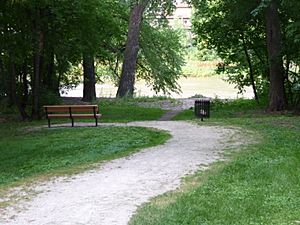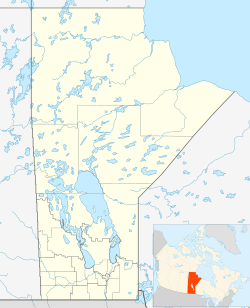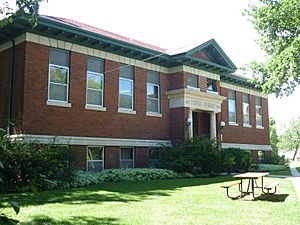Armstrong's Point facts for kids
Quick facts for kids
Armstrong's Point
|
|
|---|---|
|
Neighbourhood
|
|

East Blanchard Park, Winnipeg
|
|
| Country | |
| Province | |
| Established | 1880 |
| Area | |
| • Total | 0.3 km2 (0.1 sq mi) |
| Elevation | 234 m (768 ft) |
| Population
(2016)
|
|
| • Total | 370 |
| • Density | 1,230/km2 (3,200/sq mi) |
| Time zone | UTC−6 (CST) |
| • Summer (DST) | UTC−5 (CDT) |
| Forward Sortation Area |
R3C
|
| Area codes | 204, 431 |
Armstrong's Point is a special neighbourhood in Winnipeg, Manitoba. People sometimes call it The Gates. It's located in the West End part of the city. You'll find it on a big curve of the Assiniboine River. This area was built up in the late 1800s and early 1900s. It became a popular place for homes.
Contents
History of Armstrong's Point
How the Land Was Settled
The Hudson's Bay Company first gave this land to Joseph Hill. He came to the Red River of the North in 1849. In 1854, when Hill went back to England, he left James Armstrong in charge of the property. Armstrong was born in 1790 and passed away in 1874.
When people heard that Hill had died, the land was sold to Francis Evans Cornish. He was the very first mayor of Winnipeg. But Joseph Hill returned to Winnipeg in the early 1880s. He proved that he still owned the land. In April 1881, he sold it for $28,000 to a group of investors. These investors renamed the area Victoria Place. However, its official name was Registered Plan 119.
Building Homes in the Neighbourhood
Between 1880 and 1920, many houses were built here. The neighbourhood has four main roads: Cornish Avenue, East Gate, West Gate, and Middle Gate. The very first house was finished in 1882.
Some buildings in Armstrong's Point are very important to history. Here are a few examples:
- 20 West Gate: This is the Cornish Library, which opened in 1915.
- 40 West Gate: This building became the Consulate for France.
- 54 West Gate: This is the Ralph Connor House. It is now a National Historic Site.
- 86 West Gate: This used to be Westgate Mennonite Collegiate. It was taken down in 1989.
- 134 West Gate: This building became the Consulate for Japan.
- 158 West Gate: This was once St. John's-Ravenscourt School. It was taken down in 1950.
The Famous Gates
Design and Construction of the Gates
The special gates at East Gate, West Gate, and Middle Gate were designed in 1911. The architect was Lt. Col. Henry Norland Ruttan. They were also built in the same year. These gates stand at three entrances to the neighbourhood. They all look very similar.
They are made of stone and wrought-iron. Their style is called Classical Revival. This means they look like old Greek or Roman buildings. The people living in Armstrong's Point paid for these gates. The city's engineering department built them. It's unique because the property owners, not a real estate company, paid for them.
Politics in Armstrong's Point
Local Government Representation
Armstrong's Point has people who represent it at different levels of government.
- For the city (municipal level), Sherri Rollins represents the area. She is the Councillor for Fort Rouge - East Fort Garry.
- For the province (provincial level), Lisa Naylor represents the Wolseley area. She is an MLA (Member of the Legislative Assembly).
- For the country (federal level), Leah Gazan represents the Winnipeg Centre area. She is an MP (Member of Parliament).
Voting Trends
The neighbourhood has a mix of political views. People here don't usually vote for one candidate by a huge amount. In the 2008 federal election, about 56% of the people voted. This shows that many residents participate in elections.
Population and Demographics
| Population history | ||
|---|---|---|
| Year | Pop. | ±% |
| 1971 | 535 | — |
| 1976 | 470 | −12.1% |
| 1981 | 420 | −10.6% |
| 1986 | 395 | −6.0% |
| 1991 | 360 | −8.9% |
| 1996 | 330 | −8.3% |
| 2001 | 400 | +21.2% |
| 2006 | 360 | −10.0% |
How Many People Live Here?
In 2016, there were 370 people living in Armstrong's Point. The median household income in the neighbourhood was $59,421. This number helps us understand the average earnings of families living there.



